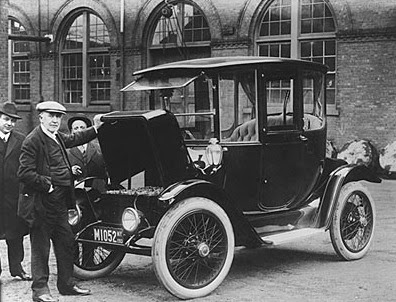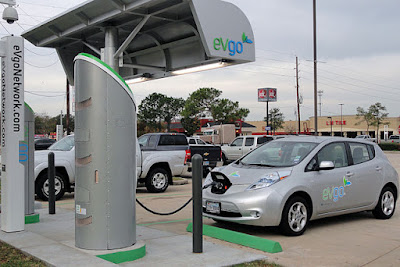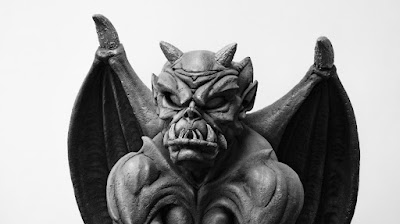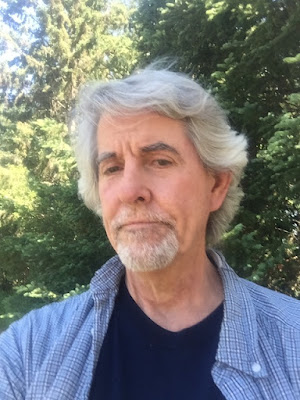The first electric vehicles I saw were at the 1998 Environmental Expo in Anaheim. The expo was a 3-day event that showcased alternative materials, alternative energy and alternative ideas around the theme of environmentally conscientious commerce.
There were five models of electric vehicles there. It's where I saw my first Prius.
A Little History
 |
| Thomas Edison with 1914 Detroit Electric model 47 (Photo credit: National Museum of American History) |
In the first 10 years of the 20th century a full one-third of all vehicles on the road were powered by electricity. Their one major drawback was that you could not drive to Boston from New York, and had no way to recharge if and when the car died in between. By the latter part of that decade we had companies developing hybrids in order to alleviate the issue of becoming stranded.
It was Henry Ford who dealt the death blow to electric cars at that time. The Model T was a truly affordable vehicle for the working man, and the electric starter was brilliant. No more cranking by hand in front of the engine. (More than a few men were killed in their garages by cars lurching into them when the engine engaged.)
The gas crisis of the 1970s brought a renewed interest in EVs, though this faded as quickly as the crisis passed. The lack of supporting infrastructure (charging stations) was a major barrier.
In 1997 Toyota introduced the first mass-produced Prius, the car I saw in Anaheim in 1998. Toyota's hybrid went global in 2000. At the New York Auto Show in 2004 every auto manufacturer but one showcased an EV or hybrid concept. Two years later a Silicon Valley startup became a new player in this market, introducing a sporty luxury EV with a 200+ mile range. Hello, Elon Musk.
The Future
 |
| Nissan Leaf recharging in Houston. |
Currently there are more than 287 million vehicles registered. There are approximately 1.3 million electric cars on the road. Of the 287 million cars and trucks powered by gas or diesel, let's assume that a fair number of these are idle. For the sake of this calculation we'll round the car count down to 227 million daily driven vehicles.
How many of these are new cars and light trucks? According to the latest figures Americas buy 17 million new cars and light trucks per year. Over the next ten years, if only EVs were purchased, that would be 170 million EVs. We all know this won't happen. The manufacturers couldn't make them fast enough.
What. is the profile of new car buyers? People with money. 10,000 Baby Boomers turn 65 each year and half of them have zero retirement savings. This means half will likely never have an EV. They will drive used gas-powered vehicles till they die.
College kids are not likely to be early adopters of EVs, despite their convictions regarding the threats imposed by climate change. They have too much debt to invest in new vehicles and the used EV market is close to non-existent now.
And then there's the problem of supply and demand. Like everything these days, supply chains are stretched to the breaking point with many hurdles to jump in order to meet consumer demand. Recent news from GM is disheartening for those eager to move forward with an affordable EV purchase. The Chevy Bolt EV recall is causing more than a few headaches as all Bolts need to have a potential fire hazard rectified. That is, they've discovered a potential fire-causing defect in the batteries. You can read the details here at Car & Driver.
When we buy a car we are purchasing a technological complex of integrated systems. When automakers introduce new designs, it's almost a given that unanticipated problems will arise, despite their best efforts. If you're an auto industry insider, you know which model years to avoid of various cars and pickups. The recall of 141,000 Bolts is more than just a headache for GM. It may be a chink in the confidence of some consumers.
Another matter seldom considered is how much strain is being put on the electrical grid once we move everyone into EVs? One can only hope that those in the control room know what they are doing.
Even without the technical hiccups which accompany any change, there are still broader implications of an EV future that we're not often considering. Here's an excerpt from an article in the October issue of Engine Builder.
The average EV utilizes around 30 kWh/100 miles, and the average vehicle gets driven around 13,500 miles in the US. Given that there are 227 million drivers in the US, switching completely to EVs would equate to a need to produce an additional 920 billion kWh of energy. As such, the U.S. would need to increase its electricity production by 25% (assuming a 90% transmission efficiency, 92% charging efficiency). This equates to 127 new nuclear reactors, 3.8 million acres of solar panels, or 300,000 acres of wind farms. (ICE vs. EV, Engine Builder, October 14, 2021)
Since we're not building new nuclear reactors at this point in time, one quickly recognizes the challenges of gearing up for a renewable energy future. Wind turbines need to be in windy areas and our very short winter days up North limit the full capabilites of solar.
Charging stations for all these vehicles will have to be built for both at work and at home, plus on the roadways of America for travelers and truckers. Add to this the retrofitting of 200,000 automotive repair shops to work on EVs (it's a totally different animal from the Internal Combustion Engine) and one readily sees that there's a lot of work to be done.
My point, you ask? Let's keep our expectations realistic. While it's good to be making these efforts, let's remember that Rome wasn't built in a day.
This is a topic we'll revisit soon, I hope. Feel free to leave a comment.





















